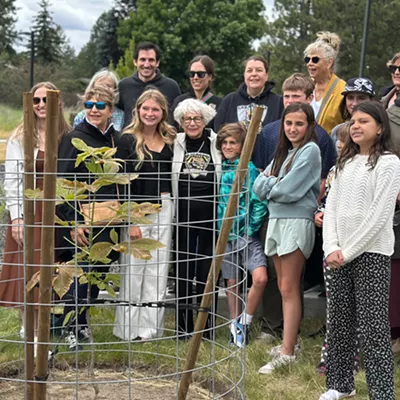Lots of people are trying to live light on the planet these days. Demand for home products made from recycled or organic materials grew 66 percent in 2001 and continues to rise, says New Hope Natural Media. During the holidays, we often follow our family traditions blindly, doing things as we've always done them. But at this time of year, when so much of our consumption takes place, even a small change toward greener practices can make a big difference.
Take wrapping paper, for instance. When I was a kid, my mother used to save the wrapping paper every year, so we always had a big bag of recycled gift wrap stashed away in a closet. Her impulse grew out of a Depression mentality rather than a desire to ease the burden in the local landfill, but the result was the same - less paper going out in the trash. If that's too down-market for your taste, some fun wrapping papers made from post-consumer waste and printed with soy-based inks are available online (check www.thegreenguide.com for sources), or you can make your own from old posters, comics or maps.
What about the tree? Well, just about any choice here could be a green choice, so to speak. A living tree, ready to plant in the yard once the holidays are over, might be the right choice for your family. Or, invest in a quality artificial tree that can be reused year after year. If you decide to follow the tradition of a cut tree, composting the tree when you're done brings on thoughts of spring. Call Spokane Regional Recycling Hotline at 509-625-6800 to find out how to compost your tree.
The newest recycled material to hit the big time is polyethylene terephthalate plastic, or good old #1 PETE from your household recycling. According to the California Department of Conservation, Americans threw away 93 billion plastic water containers last year. If laid end-to-end, that's enough containers to stretch from New York to San Francisco - more than 3,000 times. When recycled, however, plastic bottles can be purified and processed into spun fibers that are then knitted and woven into many different types of polyester fabric. Those 93 billion containers, now resting in landfills, could have provided the material to make 737 million sweaters or 546 million sleeping bags.
Fleece clothing, blankets and carpeting are but a few of the products readily available now from recycled plastic. Several companies now market home furnishings made from recycled plastics as well. Maine retailer L.L. Bean carries Adirondack chairs constructed with pre-formed "lumber" made from recycled plastic jugs; the chairs are available through the company's catalog and Web site. And Petsmart offers dog beds made from clear plastic bottles, so your pooch can live in harmony with the Earth, too.
In the bathroom and bedroom, products made from organic cotton, hemp or wool continue to gain favor. Natural Home magazine touts organic cotton towels and bedding from Coyuchi (CoyuchiOrganic.com), along with the antimicrobial properties of hemp shower curtains, offered by RealGoods.com.
So what's the big deal about organic cotton? According to a report in the Lakeland, Fla., Ledger, more than 14 pounds of pesticides per acre are used on conventionally grown cotton crops, including chemicals known to cause birth defects, cancer, sterility and brain damage. Additional chemicals used to process the cotton can exacerbate respiratory allergies in sensitive individuals.
The report quotes Lester Kan of EcoPlanet.com, an online retailer of home furnishings, gifts, household goods and clothing made from non-toxic materials: "The main reason people are demanding organic products is for health reasons," he says. "Cotton is one of the most pesticide-laden fabrics, and toxic defoliants are used to remove the cotton" from the husk.
Locating environmentally friendly gifts is not always easy, but as demand rises, retailers respond. The California Department of Conservation has created an online Green Gift Guide (www.greengiftguide.com) with links to retailers across the nation who offer such products. Last year, the site logged more than 200,000 hits during December.
"Surprisingly, many consumers simply aren't aware of all the wonderful products that can be made from recycled bottles and cans," said Darryl Young, California Department of Conservation director. "In addition, there is a real misconception that 'green' products are harder to find or more expensive. We are hoping that the Green Gift Guide will help dissolve that myth."
Locally, Lorien Natural Foods carries small appliances for a sustainable lifestyle, such as juicers, flour mills and seed grinders, but linens and home furnishings are still hard to come by. Of course, probably the greenest gift choice is a gift in the recipient's name to a charitable organization. There's no packaging, no gift wrap, your friend doesn't end up with more stuff in the house, and the charity gets a shot in the arm - it's the classic gift that keeps on giving.
Publication date: 12/18/03
















